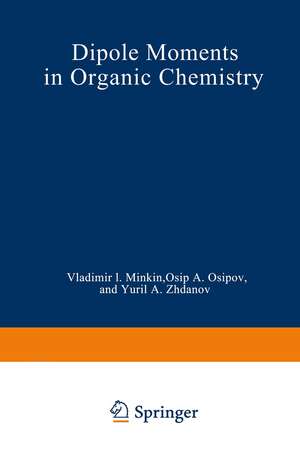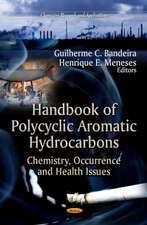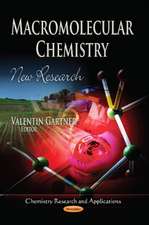Dipole Moments in Organic Chemistry: Physical Methods in Organic Chemistry
Autor V. I. Minkinen Limba Engleză Paperback – 14 iun 2012
Preț: 387.75 lei
Nou
Puncte Express: 582
Preț estimativ în valută:
74.20€ • 79.34$ • 61.86£
74.20€ • 79.34$ • 61.86£
Carte tipărită la comandă
Livrare economică 18 aprilie-02 mai
Preluare comenzi: 021 569.72.76
Specificații
ISBN-13: 9781468417722
ISBN-10: 146841772X
Pagini: 304
Ilustrații: XII, 288 p.
Greutate: 0.41 kg
Ediția:Softcover reprint of the original 1st ed. 1970
Editura: Springer Us
Colecția Springer
Seria Physical Methods in Organic Chemistry
Locul publicării:New York, NY, United States
ISBN-10: 146841772X
Pagini: 304
Ilustrații: XII, 288 p.
Greutate: 0.41 kg
Ediția:Softcover reprint of the original 1st ed. 1970
Editura: Springer Us
Colecția Springer
Seria Physical Methods in Organic Chemistry
Locul publicării:New York, NY, United States
Public țintă
ResearchCuprins
I Basic Principles of the Theory of Dielectrics.- 1. Behavior of a Dielectric in a Static Electric Field.- 2. Molecular Polarizability.- 3. Statistical Theory of the Polarization of Polar Liquid Dielectrics.- 4. Dielectric Properties of a Substance in a Variable Electric Field.- 5. Literature Cited.- II Nature of the Dipole Moment and Methods For Its Determination.- 1. Nature of the Dipole Moment.- 2. Methods of Determining Dipole Moments.- 3. Determination of the Dipole Moment in the Vapor Phase.- 4. Determination of the Dipole Moment in Dilute Solutions (Debye’s Second Method).- 5. Solvent Effect.- 6. Determination of the Dipole Moment by Means of the Stark Effect.- 7. Electric Resonance Method of Determining Dipole Moments.- 8. Determination of Dipole Moments of Liquids by Measuring Dielectric Losses in the Microwave Region.- 9. Literature Cited.- III Calculations in the Dipole Moment Method.- 1. Bond and Group Moments.- 2. Vectorial Additive Method for Calculating Dipole Moments of Molecules from Bond and Group Moments.- 3. Critical Observations on the Vectorial Additive Scheme and Methods for Its Improvement.- 4. Quantum-Mechanical Calculations of the Dipole Moments of Complex Molecules.- 5. Literature Cited.- IV Dipole Moments and the Stereochemistry of Organic Compounds.- 1. The Dipole Moment and the Symmetry of the Molecule.- 2. Geometrical cis-trans Isomerism Relative to Double Bonds.- 3. s-cis-trans Isomerism.- 4. Nonplanar Conformations of Aryl Nuclei in Uncondensed Aromatic Systems.- 5. Conformational Analysis of Saturated Cyclic Systems.- 6. Internal Rotation Relative to Single Bonds.- 7. Literature Cited.- V Dipole Moments and the Electronic Structure of Organic Compounds.- 1. Induction Effect.- 2. Conjugation of an Unsaturated System with Polar Groups.Mesomeric Moments. Interaction Moments.- 3. Dipole Moments and Intramolecular Polarization.- 4. Literature Cited.- VI Dipole Moments and Some Special Problems of the Structure and Properties of Organic Compounds.- 1. Tautomerism.- 2. The Hydrogen Bond.- 3. Intermolecular Interactions.- 4. Dipole Moments of Molecules in Electronically Excited States.- 5. Literature Cited.









